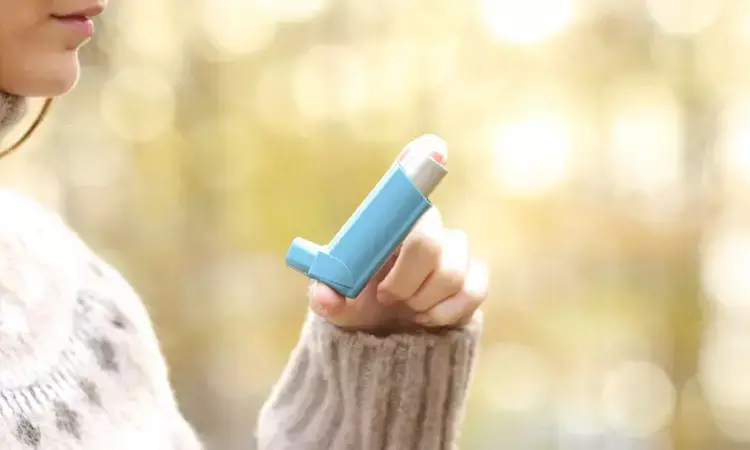- Home
- Medical news & Guidelines
- Anesthesiology
- Cardiology and CTVS
- Critical Care
- Dentistry
- Dermatology
- Diabetes and Endocrinology
- ENT
- Gastroenterology
- Medicine
- Nephrology
- Neurology
- Obstretics-Gynaecology
- Oncology
- Ophthalmology
- Orthopaedics
- Pediatrics-Neonatology
- Psychiatry
- Pulmonology
- Radiology
- Surgery
- Urology
- Laboratory Medicine
- Diet
- Nursing
- Paramedical
- Physiotherapy
- Health news
- Fact Check
- Bone Health Fact Check
- Brain Health Fact Check
- Cancer Related Fact Check
- Child Care Fact Check
- Dental and oral health fact check
- Diabetes and metabolic health fact check
- Diet and Nutrition Fact Check
- Eye and ENT Care Fact Check
- Fitness fact check
- Gut health fact check
- Heart health fact check
- Kidney health fact check
- Medical education fact check
- Men's health fact check
- Respiratory fact check
- Skin and hair care fact check
- Vaccine and Immunization fact check
- Women's health fact check
- AYUSH
- State News
- Andaman and Nicobar Islands
- Andhra Pradesh
- Arunachal Pradesh
- Assam
- Bihar
- Chandigarh
- Chattisgarh
- Dadra and Nagar Haveli
- Daman and Diu
- Delhi
- Goa
- Gujarat
- Haryana
- Himachal Pradesh
- Jammu & Kashmir
- Jharkhand
- Karnataka
- Kerala
- Ladakh
- Lakshadweep
- Madhya Pradesh
- Maharashtra
- Manipur
- Meghalaya
- Mizoram
- Nagaland
- Odisha
- Puducherry
- Punjab
- Rajasthan
- Sikkim
- Tamil Nadu
- Telangana
- Tripura
- Uttar Pradesh
- Uttrakhand
- West Bengal
- Medical Education
- Industry
Night Shifts Linked to Increased Asthma Risk in Postmenopausal Women: Study

A recent study using data from over 280,000 participants in the UK Biobank revealed a strong link between night shift work and asthma risk in women, particularly in postmenopausal women not using hormone replacement therapy (HRT). The findings published in the ERJ Open Research, highlighted the need to examine how occupational patterns intersect with biological factors to influence respiratory health.
Asthma, already more prevalent in females than males, has also been previously associated with night shift work. With more women joining the shift work labor force, scientists sought to determine whether the asthma risk tied to shift work differs between sexes.
This study employed logistic regression models to assess asthma prevalence across various work schedules, adjusting for factors like age, smoking status, body mass index, and socioeconomic status. The results revealed that women working permanent night shifts had a 50% higher risk of moderate to severe asthma when compared to their counterparts working regular daytime hours. In contrast, no significant association was observed in men.
Also, female night shift workers showed an odds ratio (OR) of 1.50 (95% confidence interval [CI] 1.18–1.91) for moderate to severe asthma when compared to female day workers. Men working night shifts had an OR of 0.95 (CI 0.72–1.26), which suggested no increase in the risk. A statistically significant sex interaction (p=0.01) further highlighted that the relationship between shift work and asthma is indeed stronger in women.
The findings were consistent across broader asthma indicators, including self-reported asthma and symptoms such as wheezing or whistling in the chest. This study explored whether the increased risk in women was related to hormonal changes. Among postmenopausal women not using HRT, the asthma risk was even higher, with an adjusted OR of 1.89 (CI 1.24–2.87) for moderate to severe asthma in permanent night workers versus day workers. However, this elevated risk disappeared among postmenopausal women who were using HRT, suggesting a potential protective effect.
The study also considered chronotype (morning or evening preference), but the observed sex-specific risks remained most clearly aligned with menopause and HRT status rather than sleep timing preference alone. These findings suggest that circadian rhythm disruption, hormonal imbalances, or both may underlie the heightened vulnerability observed in women. Overall, these findings stress the need for proactive health monitoring and tailored workplace policies aimed at minimizing chronic disease risk linked to modern work patterns.
Source:
Maidstone, R. J., Ray, D. W., Liu, J., Bowden, J., Rutter, M. K., & Durrington, H. J. (2025). Increased risk of asthma in female night shift workers. ERJ Open Research, 00137–02025. https://doi.org/10.1183/23120541.00137-2025
Neuroscience Masters graduate
Jacinthlyn Sylvia, a Neuroscience Master's graduate from Chennai has worked extensively in deciphering the neurobiology of cognition and motor control in aging. She also has spread-out exposure to Neurosurgery from her Bachelor’s. She is currently involved in active Neuro-Oncology research. She is an upcoming neuroscientist with a fiery passion for writing. Her news cover at Medical Dialogues feature recent discoveries and updates from the healthcare and biomedical research fields. She can be reached at editorial@medicaldialogues.in
Dr Kamal Kant Kohli-MBBS, DTCD- a chest specialist with more than 30 years of practice and a flair for writing clinical articles, Dr Kamal Kant Kohli joined Medical Dialogues as a Chief Editor of Medical News. Besides writing articles, as an editor, he proofreads and verifies all the medical content published on Medical Dialogues including those coming from journals, studies,medical conferences,guidelines etc. Email: drkohli@medicaldialogues.in. Contact no. 011-43720751


